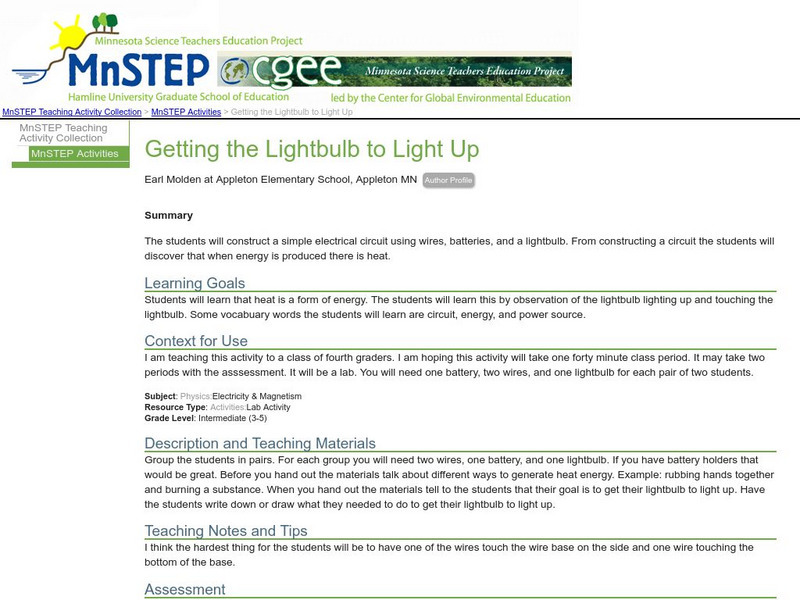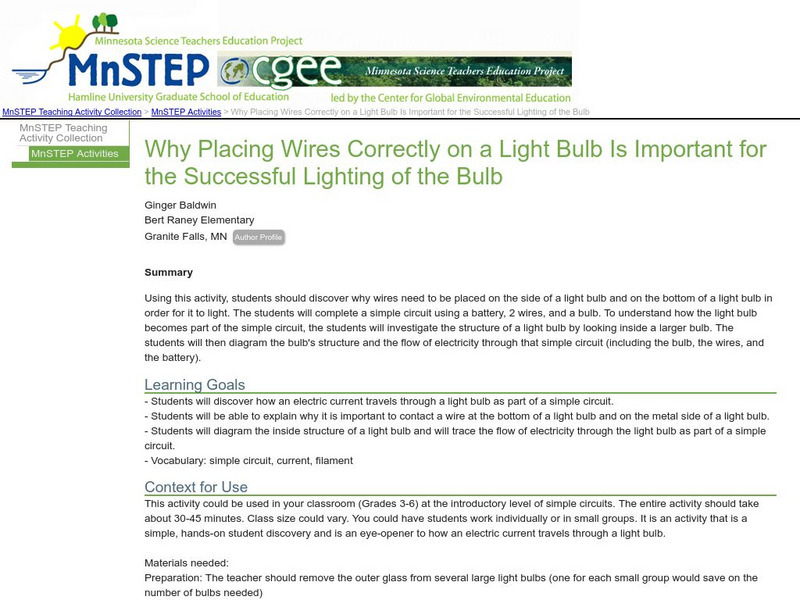Science and Mathematics Initiative for Learning Enhancement (SMILE)
Smile: Electric Currents and Circuits
This cooperative learning activity for intermediate to junior high students has them create various electrical circuits in order to understand electricity.
Technovation
Curiosity Machine: Challenges: Engineer an Electric Switch
Using your knowledge of the flow of electricity, do you think you could build a switch that can complete a circuit to turn on an LED? This site contains the challenge, tips, a lesson plan, and a place for students to document their...
Curated OER
Science Kids: Science Images: Electricity Circuit Diagram
This basic electricity circuit diagram shows a resistor and ammeter in series, a voltmeter in parallel and a switch with a cell for charging purposes.
Intel Corporation
Intel Education: Circuits and Switches
By comparing household electricity to household plumbing, this tutorial makes the concepts of electricity easier to understand. Includes video clips and interactive activities; click on "Instructional Strategies" for teacher resources...
Ducksters
Ducksters: Kids Science: Electricity 101
Kid's learn about the basic science of electricity. What is it and how it works.
TeachEngineering
Teach Engineering: Circuits and Magnetic Fields
In this activity, students use the same method as in the activity from lesson 2 to explore the magnetism due to electric current instead of a permanent magnet. Students use a compass and circuit to trace the magnetic field lines induced...
Science Education Resource Center at Carleton College
Serc: Getting the Lightbulb to Light Up
Students construct a simple electrical circuit using wires, batteries, and a lightbulb. From constructing a circuit the students will discover that when energy is produced there is heat.
Concord Consortium
Concord Consortium: How Do Breadboards Work?
See how a breadboard electrical circuit works.
CK-12 Foundation
Ck 12: Physics Simulation: Flashlight
[Free Registration/Login Required] Learn about electric circuits, the flow of current, electrical resistance, and electrical power dissipation by exploring the operation of a flashlight using this interactive simulation. A PDF worksheet...
National High Magnetic Field Laboratory
Magnet Academy: Wheatstone Bridge 1843
Read about the device used for measuring resistance in a circuit which was discovered in 1843, but had been invented a decade earlier. The inventor's name was not Wheatstone.
Science Museum, London
Science Museum: Robot Bugs
Build a robot and watch how it moves. Activity is designed to help students learn how electrical circuits and switches control how things move.
Science Education Resource Center at Carleton College
Serc: Mn Step: Why Placing Wires Correctly on a Light Bulb Is Important
Learners will learn about simple electric circuits as they investigate the structure of a light bulb and how electricity flows through it.
Famous Scientists
Famous Scientists: Gustav Kirchoff
Find out about the life and work of Gustav Kirchoff, who made contributions to the fundamental understanding of black-body radiation emitted by heated objects, spectroscopy, and electrical circuits.
Maryland Science Center
Maryland Science Center: Build a Conductivity Tester [Pdf]
Instructions on how to build an instrument that can be used to test which materials are conductors and which are insulators, in order to bridge a gap in an electrical circuit.
Physics Aviary
Physics Aviary: Schematic Symbol Identification
This game is designed to help students learn the names of some of the schematic symbols they will encounter in electric circuit diagrams.
Science Buddies
Science Buddies: Dance Mania: Build Your Own Dance Pad!
The objective of this electricity and electronics science fair project is to build a dance pad that flashes lights when you step on it.
Khan Academy
Khan Academy: Dc Circuit and Electrical Power Review
Review the components of a circuit and their symbols such as battery, resistor, and switch. Analyze how the power of a resistor is related to the current and electric potential difference across the resistor.
Concord Consortium
Concord Consortium: Dc Circuits: Series Resistances (Sparks 1)
This interactive simulation guides you through the wiring of the standard breadboard and presents you with questions regarding voltage drops and currents in series resistive circuits.
Concord Consortium
Concord Consortium: Troubleshooting Dc Circuits (Sparks 4)
Discover a sequence of all-resistor DC circuits in which one of the resistors is either open or short-circuited.
Concord Consortium
Concord Consortium: Dc Circuits: Series Parallel Resistances (Sparks 3)
Answer questions regarding voltage drops across resistors and currents through them in such circuits. Practice calculating the effective resistances of a set of resistances in series and parallel.
Khan Academy
Khan Academy: Electrical Engineering: Amplifiers
Amplifiers make signals bigger. Amplification is often the most basic operation of an electronic circuit. There are many kinds of amplifier designs. We will describe the operational amplifier, the building block of most analog electronics.
Khan Academy
Khan Academy: Electric Potential Difference and Ohm's Law Review
Review the key terms, equations, and skills related to Ohm's law, including how electric potential difference, current, and resistance are related.
Science4Fun
Science4 Fun: Electronic Circuit
What is an electronic circuit? Resource provides a discussion of series, parallel, and series-parallel circuits plus more.
Science Buddies
Science Buddies: Which Materials Are the Best Conductors?
There are two main types of materials when it comes to electricity, conductors, and insulators. What are they made of? Find out by testing different materials in a circuit to see which ones conduct the most electricity.
Other popular searches
- Basic Electricity Circuits
- Electricity Circuits Current
- Electricity Circuits Safety
- Basic Electricity and Circuits
- Circuits Electricity
- Electricity Circuits Project
- Electricity Circuits Proiect

















